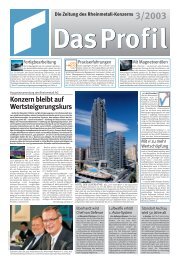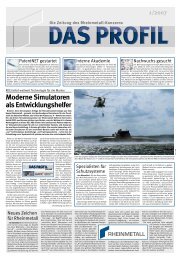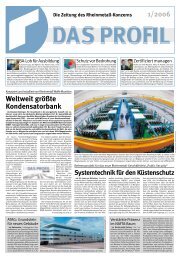PDF [1.6 MB] - Kolbenschmidt Pierburg AG
PDF [1.6 MB] - Kolbenschmidt Pierburg AG
PDF [1.6 MB] - Kolbenschmidt Pierburg AG
Create successful ePaper yourself
Turn your PDF publications into a flip-book with our unique Google optimized e-Paper software.
Rheinmetall buys<br />
Zaugg Elektronik<br />
Düsseldorf. The Rheinmetall<br />
group continues to expand its defence<br />
technology portfolio, taking<br />
up a 100% stake in Zaugg Elektronik<br />
<strong>AG</strong> of Lohn-Ammannsegg,<br />
Switzerland, effective 1 January<br />
2007. Jointly owned, Zaugg Elektronik<br />
was previously controlled<br />
via a holding company.<br />
The takeover represents another<br />
important strategic step in Rheinmetall’s<br />
consolidation of the European<br />
land systems sector,<br />
strengthening the group’s status<br />
as a single-source supplier of<br />
medium- and large-caliber ammunition.<br />
As well as widening its<br />
range of products, the acquisition<br />
reduces Rheinmetall’s dependence<br />
on external suppliers and<br />
opens up new sales opportunities.<br />
An internationally renowned manufacturer<br />
of military fuse systems,<br />
Zaugg Elektronik <strong>AG</strong> supplies numerous<br />
European and North American<br />
defence contractors with<br />
highly specialized fuses for medium-<br />
and large-caliber ammunition.<br />
Newsline<br />
The Swedish Defence Materiel Administration has awarded Rheinmetall Waffe Munition GmbH an order for Birdie 118 aircraft<br />
decoys for Swedish Air Force helicopters. The decoys will be delivered in 2007 and used in future international operations.<br />
Sweden contracts<br />
Birdie 118 system<br />
Stockholm/Düsseldorf. The Swedish<br />
Defence Materiel Administration<br />
has awarded Rheinmetall Waffe Munition<br />
GmbH an order for Birdie 118 aircraft<br />
decoys for Swedish Air Force helicopters.<br />
The decoys will be delivered<br />
in 2007 and used in future international<br />
operations.<br />
Birdie, an acronym for “Bi-spectral<br />
InfraRed Decoy Improved Efficiency”, is<br />
a proprietary development of Rheinmetall<br />
Defence. The Birdie represents a<br />
new departure in protecting helicopters<br />
against modern infrared-guided<br />
surface-to-air and air-to-air missiles. It<br />
is also uniquely effective in countering<br />
shoulder-launched Manpads.<br />
It can be used in any 1x1” Nato standard<br />
dispensing system for aircraft<br />
self-protection, and is also available<br />
in a 2x1” caliber version, the Birdie<br />
218. Numerous Nato and national<br />
Amoun batteries<br />
with good results<br />
Kuwait City/Rome. Some weeks ago<br />
the very first firing campaign with four<br />
advanced Amoun batteries from<br />
Rheinmetall Italy – including two of<br />
the systems delivered to the Kuwaiti<br />
armed forces a short time ago – was<br />
conducted in the middle of the desert<br />
about 100 km to the west of Kuwait<br />
City. The official handover of these systems<br />
had been celebrated in the presence<br />
of high-ranking visitors.<br />
Five Aspide missiles were launched<br />
from SAM missile launchers during the<br />
tests; the test team also fired 35mm<br />
anti-aircraft guns six times. The test results<br />
were excellent and to the full satisfaction<br />
of all involved. The systems<br />
employed for the first test campaign<br />
consisted of two Amoun batteries,<br />
each with a Skyguard Fire Control Unit<br />
(FCU), two 35mm anti-aircraft guns<br />
and two SAM missile launchers. The<br />
delivery agreement for the two Amoun<br />
systems that served as a partial replacement<br />
for the five batteries that<br />
had disappeared during the Iraqi invasion<br />
had been concluded in 2002 and<br />
officially finalized a few months ago.<br />
14<br />
tests have proved the Birdie’s effectiveness<br />
against even the most advanced<br />
guided missiles with twocolour<br />
analysis.<br />
Rheinmetall Weapon and Munitions,<br />
a business unit of the Düsseldorfbased<br />
Rheinmetall Defence group, is<br />
one of the world’s leading manufacturers<br />
of self-protection systems and<br />
decoys for protecting military and<br />
civilian assets. The Swedish order<br />
represents a breakthrough in the international<br />
market.<br />
Claudio Koporossy, sales director at<br />
Rheinmetall Italy in Rome on the successful<br />
test campaign: “The firing<br />
tests were organized in four sessions;<br />
the first three were basically training<br />
and exercising and the last day was<br />
the VIP event attended by numerous<br />
high-ranking visitors, including the<br />
Chief of Staff of the Armed Forces and<br />
his deputy, all forces commanders<br />
and many generals.”<br />
The third missile launch was particularly<br />
notable according to Koporossy:<br />
“A so-called friendly target<br />
was simulated. The Aspide missile<br />
has a self-destruction mechanism<br />
which can be triggered from the Skyguard<br />
system – something that was<br />
done in this test. This allowed us to<br />
demonstrate an important function<br />
of the system that permits missile<br />
destruction in flight if – at the last<br />
minute – a target is identified as<br />
friendly.”<br />
Thanks to the outstanding results<br />
of the test campaign in Kuwait, sales<br />
manager Koporossy rates the<br />
chances of further system deliveries<br />
to Kuwait - to substitute the three<br />
Amoun batteries that went missing in<br />
1990/1991 and have not yet been replaced<br />
– as good.


![PDF [1.6 MB] - Kolbenschmidt Pierburg AG](https://img.yumpu.com/8657804/14/500x640/pdf-16-mb-kolbenschmidt-pierburg-ag.jpg)



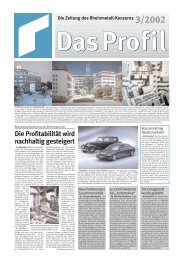
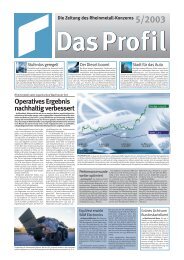
![PDF [2.4 MB] - Kolbenschmidt Pierburg AG](https://img.yumpu.com/8295864/1/184x260/pdf-24-mb-kolbenschmidt-pierburg-ag.jpg?quality=85)
![PDF [2.5 MB] - Kolbenschmidt Pierburg AG](https://img.yumpu.com/8112793/1/184x260/pdf-25-mb-kolbenschmidt-pierburg-ag.jpg?quality=85)




